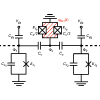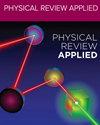Pulse-based variational quantum optimization and metalearning in superconducting circuits
IF 4.4
2区 物理与天体物理
Q2 PHYSICS, APPLIED
引用次数: 0
Abstract
Solving optimization problems using variational algorithms stands out as a crucial application for noisy intermediate-scale devices. Instead of constructing gate-based quantum computers, our focus centers on designing variational quantum algorithms within the analog paradigm. This involves optimizing parameters that directly control pulses, driving quantum states toward target states without the necessity to compile a quantum circuit. In this work, we introduce pulse-based variational quantum optimization (PBVQO) as a hardware-level framework. We illustrate the framework by optimizing external fluxes on superconducting quantum interference devices, effectively driving the wave function of this specific quantum architecture to the ground state of an encoded problem Hamiltonian. Given that the performance of variational algorithms relies heavily on appropriate initial parameters, we introduce a global optimizer as a metalearning technique to tackle a simple problem. The synergy between PBVQO and metalearning provides an advantage over conventional gate-based variational algorithms.

超导电路中基于脉冲的变异量子优化和金属刻蚀
使用变分算法解决优化问题是噪声中等规模器件的一个重要应用。我们的重点不是构建基于门的量子计算机,而是在模拟范例中设计变分量子算法。这涉及优化直接控制脉冲的参数,从而在无需编译量子电路的情况下将量子态驱动至目标态。在这项工作中,我们引入了基于脉冲的变分量子优化(PBVQO)作为硬件级框架。我们通过优化超导量子干涉器件上的外部通量来说明该框架,从而有效地将这种特定量子架构的波函数驱动到编码问题哈密顿的基态。鉴于变分算法的性能在很大程度上依赖于适当的初始参数,我们引入了全局优化器作为金属学习技术来解决一个简单的问题。与传统的基于门的变分算法相比,PBVQO 和金属学习之间的协同作用更具优势。
本文章由计算机程序翻译,如有差异,请以英文原文为准。
求助全文
约1分钟内获得全文
求助全文
来源期刊

Physical Review Applied
PHYSICS, APPLIED-
CiteScore
7.80
自引率
8.70%
发文量
760
审稿时长
2.5 months
期刊介绍:
Physical Review Applied (PRApplied) publishes high-quality papers that bridge the gap between engineering and physics, and between current and future technologies. PRApplied welcomes papers from both the engineering and physics communities, in academia and industry.
PRApplied focuses on topics including:
Biophysics, bioelectronics, and biomedical engineering,
Device physics,
Electronics,
Technology to harvest, store, and transmit energy, focusing on renewable energy technologies,
Geophysics and space science,
Industrial physics,
Magnetism and spintronics,
Metamaterials,
Microfluidics,
Nonlinear dynamics and pattern formation in natural or manufactured systems,
Nanoscience and nanotechnology,
Optics, optoelectronics, photonics, and photonic devices,
Quantum information processing, both algorithms and hardware,
Soft matter physics, including granular and complex fluids and active matter.
 求助内容:
求助内容: 应助结果提醒方式:
应助结果提醒方式:


